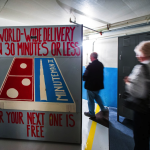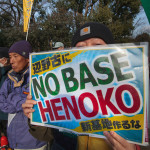- DETERRENCE: Atomic amnesia: photographs and nuclear memory
- GOVERNANCE AND CIVIL SOCIETY: Tokyo sidesteps elected officials in Okinawa, offers direct subsidies to Nago district
- AUSTRAL PEACE AND SECURITY: Introduction to Rebecca Gordon, How the U.S. created Middle East mayhem
 DETERRENCE: Atomic amnesia: photographs and nuclear memory, Jessie Boylan, Global Change, Peace & Security (1 July 2015) [subscription, PDF, 1.8 MB]
DETERRENCE: Atomic amnesia: photographs and nuclear memory, Jessie Boylan, Global Change, Peace & Security (1 July 2015) [subscription, PDF, 1.8 MB]
Photographic images are used by the military to document effects of nuclear weapons; by civilians to witness the impacts on otherwise invisible survivors and victims; by activists to protest and seek abolition; by sociologists to explore impingement on daily life. Photographic images are crucial to the (de)construction of fear which underlies nuclear deterrence and pervades modern life. Nuclear war will not only end time, but images.
- Camera Atomica, John O’Brian edited, Art Gallery of Ontario and Black Dog Press (2015) (book)
- Next exit, Armageddon: Photos of America’s nuclear weapons legacy, Jim Lo Scalzo, Washington Post (16 June 2015)
- Making visible: Photography, witnessing and the nuclear era, Blake Ross Fitzpatrick, University of Toronto (2002) [PDF, 12 MB]
GOVERNANCE AND CIVIL SOCIETY: Tokyo sidesteps elected officials in Okinawa, offers direct subsidies to Nago district, Takuya Suzuki, Kazuki Uechi and Takufumi Yoshida, Asahi Shimbun (27 October 2015)
With the Okinawa regional government blocking reclamation work for a long-disputed US military base’s relocation, the Abe administration has bypassed the governor and offered direct subsidies to appointed community representatives to support the base. The national government also plans to restart reclamation work despite any moves by the regional government, sparking more protests and raising legal questions.
- Japan overturns move to block expansion of US base in Okinawa, Andy Sharp and Isabel Reynolds, Bloomberg (26 October 2015)
- Okinawa governor revokes permit for construction of new US marine base, Anna Fifield, Washington Post (13 October 2015)
- Protestors in Japan slam resumption of land reclamation, Business Standard (27 October 2015)
 AUSTRAL PEACE AND SECURITY: Introduction to Rebecca Gordon, How the U.S. created Middle East mayhem,Tom Engelhardt, Tomgram (20 October 2015)
AUSTRAL PEACE AND SECURITY: Introduction to Rebecca Gordon, How the U.S. created Middle East mayhem,Tom Engelhardt, Tomgram (20 October 2015)
‘It remains difficult to take in the degree to which the American invasions of Afghanistan and Iraq destabilized the Greater Middle East from the Chinese border to Libya.’ Engelhardt’s encomium (or Cordesman’s for that matter) on the incoherence of US policy is lost on its Australian ally. Addicted to alliance war, Australia’s forces are in Afghanistan (2001 – ), Iraq (2003 – 2009, 2014 – ), Syria (2015 –), and now in CTF 150, Yemen from the sea (2014 –). Now it is set to import the US ‘success’ of special forces – in place of focus on sustainable policy outcomes.
- ISIS and “failed state wars”: Libya, Syria, Iraq, and Yemen, Anthony H. Cordesman, CSIS, (22 October 2015)
- Nick Turse, Success, failure, and the “finest warriors who ever went into combat, Tomgram (25 October 2015).
- A versatile force: the future of Australia’s special operations capability, Andrew Davies, Peter Jennings, and Benjamin Schreer, ASPI (April 2014)
The Nautilus Peace and Security Weekly Report presents articles and full length reports each week in six categories: Austral security, nuclear deterrence, climate change and security, the DPRK, climate change adaptation and governance and civil society. Our team of contributors carefully select items that highlight the links between these themes and the three regions in which our offices are found — North America, Northeast Asia, and the Austral-Asia region.
Subscribe to NAPSNet to receive free weekly email reports.
- Editor: Arabella Imhoff
Contributors:
- Deterrence: Peter Hayes
- DPRK: Roger Cavazos
- Governance and Civil Society: Dyana Mardon
- Climate Change Adaptation: Saleem Janjua
- Climate Change and Security: Richard Tanter



One thought on “Nautilus Peace and Security Network – 29 October 2015”